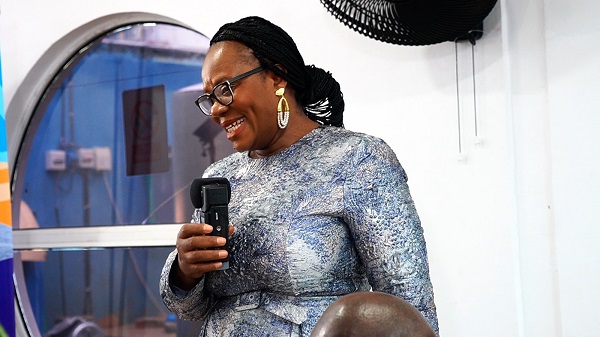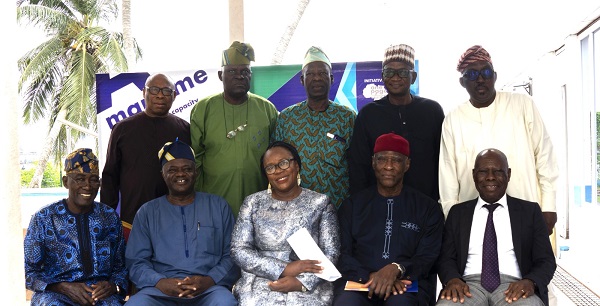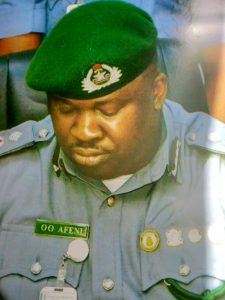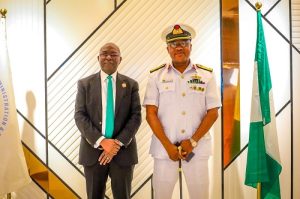My Vision of Nigeria’s Waterside Centre, by Hope Orivri

Hope Orivri

Maritime journalist, Publisher of One Page Africa and Chief Executive Officer of Waterside Centre, Mrs Hope Orivri (PhD), in this interview explains her vision of the Waterside Centre, maritime community hub, which was commissioned recently in Lagos. Shipping Day was there. Excerpts:
Your company has just commissioned Waterside Centre, can you give us an idea of what the Centre stands for?
The gathering for today actually is the unveiling of our maritime community hub which is tagged the Waterside Center. We know in the maritime industry there are very many stakeholder engagements, people gather for several kinds of meetings and hold conferences. Therefore, the Waterside Center is looking at creating a community for social interaction among people who have maritime as their primary interest.
One key thing for the Waterside Centre is mentorship for young seafarers, port operators, boat operators and to even mentor residents in the coastal communities.
The maritime industry or the maritime stakeholders don’t operate in a vacuum, they operate in communities. What’s wrong if we have a centre where youths in the community can come in, hang out, and understand what the maritime industry is all about. I bet you indeed there are people in these communities who may not really know, they just know that they see seafarers without knowing what the maritime sector is about. We are hoping that with this platform, we will be able to create such community to give people that place, that sense of home, where they can come and engage. We also have knowledge sharing sessions.
We also learnt about the Mariner’s Forum which is subset of the Waterside Centre, what’s the rationale behind the forum?
We can see what the Mariners Forum, which is under the Waterside Centre, did today. In fact we’re thinking the mariners would just talk briefly on some industry issues, but for them that nostalgia of being at sea, the experiences that they’ve had over the years spurred them into recounting several past experiences and lessons for the sector. The Mariners Forum is a platform where mariners come together and discuss issues about the industry.
They’re not just discussing about today; they’re looking at how activities of previous years impacted and shaped what the maritime industry is today and how it’s going to shape the industry in the future.
We also take sustainability issues very important. The things we do today in the maritime sector, how are we doing them? We talk about the marine and blue economy – people who do fishing, particularly those who stay along the coastal areas. Are they still able to ply their trade of fishing as much as they used to some 20 or 30 years back? No. One very big reason for that is the issue of marine plastic pollution.
There are projections that with the rate at which we are going, if people continue to use single-use plastics, by 2050 we’ll have more marine plastics in the marine environment than fishes. I am also deep into public health and I’m concerned about the health of children under the age of 5 years. This category of children get most of their daily required amount of protein from fishes.
You will agree with me that as much as people could afford fish 10 years ago, they can’t today. Titus fish, Mackerel, and all those ones that mothers used to buy for N200 or N300, they can’t do it anymore. We seem to just be going on as if nothing’s happening but a lot is happening. Our children can’t be able to get protein from fish. So it is a concern. These are some of the pertinent issues that we encourage people to come discuss at the Waterside Centre.
Nevertheless, let’s not only focus on having the very serious discussions at big conferences and the rest; here we also have a place where we can just stroll in to discuss issues. We saw what happened today. The veteran mariners let their guards down. They talked how it was with them in previous years and we can draw lessons from these discussions to be able to further advance the maritime industry for today and the future.
Would the Waterside Centre explore partnerships with the government and other maritime industry stakeholders?
It’s just about partnerships. If you look at Sustainable Development Goal (SDG) 17, it talks about partnerships. If you have the very great ideas, it won’t go far if you don’t partner with others. So to keep it in view, to have governments see what we are doing, feel what we are doing, and contribute to what we are doing, we are going to be seeking for partnerships so that they can contribute, they can sponsor, they can be a part of the things that we are doing.
How often would these engaging sessions for Mariners and other stakeholders hold?
In fact, from what the mariners were even saying, they want it to be very often. We would like that, but let’s be realistic. You talk about logistics and some other things. They require funding. We don’t just want to come and discuss. There should be something to take away and that will require funding.
During the maiden edition of the Mariners’ Forum which held in honour of the late Dr. Chris Asoluka, the mariners have been able to raise very critical issues including; the need for Protection and Indemnity (P&I) clubs, rejigging the maritime training approach for seafarers, an appraisal of the Maritime Academy of Nigeria (MAN) Oron and other training institutions in the country. These are the kind of issues we expect to be addressed in these engagements.
It is also important to note that the Waterside Centre isn’t for mariners alone. It’s a maritime community hub where we are going to be discussing the issues of trade, which concerns the customs, marine litters, marine environment management, public health in coastal communities, among others.
We are also going to be talking about mentorship for young seafarers, and remember that we are very concerned about community because the maritime industry in itself does not operate in a vacuum. It operates in communities. We want the people who originally belong to these coastal communities to be a part of it.
The concept of blue economy is seen as a new development in Nigeria, but fishing and inland waterways transport have been in existence in many coastal areas for decades. These are also part of the blue economy and there are very many issues that affect them but they don’t have places to discuss them. They don’t always have to wait until there is one big conference.
There’s what we call the indigenous knowledge and it doesn’t matter even if people have not gotten formal education. When you see the local people, particularly in the marine marine communities, they have indigenous knowledge for doing things. For example, the way they weave their nets for fishing. It’s a big economic activity, but they have the indigenous knowledge how they do it. They know how to tie their nets and how to maintain their boats. These are knowledge that they are using to work in the blew economy.
How can the Waterside Centre strategically target the leaders in coastal communities to sensitize properly and also educate them on much-needed changes?
Like I mentioned earlier, it’s a maritime community hub. That means the hub is going to be made up of people in different sub-sectors of maritime. For those who are in the coastal communities, they are welcomed. I have done studies that took me to coastal communities in several places including; Abete, Agoyegun, Maracana, among others.
There is always a need for sensitization and engaging with their leaders. Therefore, we are letting them know that there’s a place like this to have that sensitisation. We are saying let’s come together to share and understand what their challenges are.
We know that for 2-3 years now, this administration has been talking a lot about the inclusivity in the marine and blue economy. This Waterside Centre is going to meet with them, engage with them, hear from them, and then share knowledge with them.
The idea is not just sharing knowledge with them and leaving them, but to have activities that will cause them to participate in events, in programs, so they can be heard, not just heard alone, but also seen and interacted with positively.





